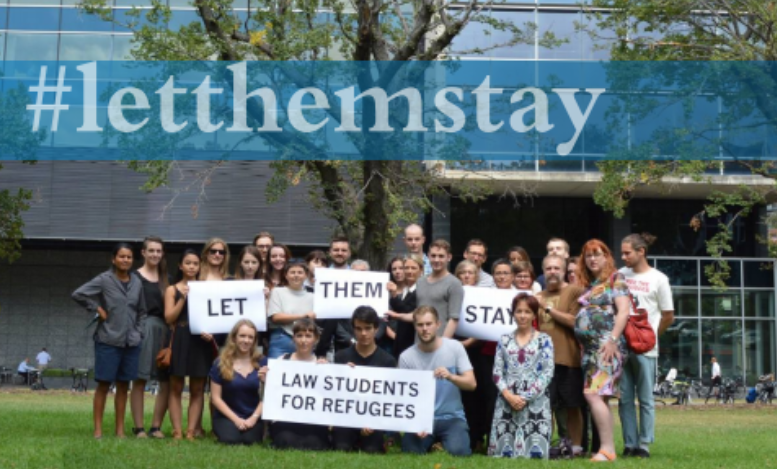|
SARAH MOORHEAD Volume 9, Issue 2 Last week, the #LetThemStay campaign arrived at Melbourne Law School. Staff and students assembled to hold banners depicting the campaign slogan, as members of many other organisations around Australia have done over the past few weeks. For refugee advocates, popular movements like #LetThemStay are at once heartening and problematic. On the one hand, demonstrations of serious concern from the general public are enormously rewarding; on the other, there is always the fear that concentrating on finite battles — letting 267 asylum seekers stay in Australia — will distract and detract from the broader effort to end offshore processing entirely. Anyone subject to Australia’s mandatory immigration detention is subjected to appalling and unjustified degradation, not just people returning after an arbitrarily granted reprieve. This is a reasonable concern, and one common to many social justice causes. People can only care so much. Depicting asylum seeker kids running about in Aussie school uniforms may effectively tap into most people’s empathy. It’s another matter to extend that compassion to less obviously sympathetic targets, such as the 929 single men Manus Island is slowly breaking. If a solution to the immediate problem is found, will the doctors, teachers and lecturers who waved banners and tweeted vociferously lose interest? If they do, without anything having really changed, the overall movement may founder. However, the counterargument is at least equally compelling: what alternatives are there? The #LetThemStay campaign arose in response to the High Court’s decision in M68/2015. With this decision, a majority of the High Court affirmed the legality of the offshore processing regime set up via a series of agreements between the Australian government and those of Nauru and Papua New Guinea. Seemingly flying in the face of a key principle we learn at law school, the Court took a distinctly form-over-substance approach, holding — in brief — that the detention was not actually undertaken by the Australian government, and that the arrangements facilitating the detention were valid exercises of the government’s power under section 61 of the Constitution. Not only has the decision confirmed the legal right of the government to transfer those 267 asylum seekers out of Australia, it has severely compromised future legal challenges to offshore processing involving detention. This was a disappointing decision; conservative at best, cowardly at worst. Assuming that it is nonetheless legally sound (though this has been questioned by MLS’ own experts, among others), the decision illustrates the limitations of relying on the legal process to combat government policies. The power of the courts to interfere in acts of government and Parliament will always be constrained to policing the boundaries of constitutionally valid law. With litigation contingent on judicial interpretation, and the government constantly finding new ways to expand its reach, those boundaries are always uncertain, and so are the prospects of success for those seeking to challenge the actions of elected politicians. And if those politicians lie to their constituents? If they repeatedly make rules that flout international law, and have terrible consequences for the welfare of thousands of blameless people? Fear is a powerful political device, used by governments around the world to implement policies of exclusion and intolerance. But in a democracy like Australia’s, run by careerist politicians ever-conscious of the election cycle, it’s a sword that can cut both ways: convince the politicians that their conduct will lose them their votes and their jobs, and ostensibly strongly-held personal convictions will fade quicker than you can say “Newspoll”. This is why popular campaigns like #LetThemStay are important; the literal demonstration of public disapproval strikes fear into politicians in a way that judicial challenges do not. After all, if the government loses, it can just rewrite the law — in fact, M68 demonstrates that the government doesn’t even wait for a loss before getting out the red pen: shortly after the challenge was initiated, the government rushed through a suite of retroactive laws aimed at distancing Australia from the offshore facilities. Incremental change has its dangers. But provided advocates link the battles to the war — pointing out that we shouldn’t send 267 asylum seekers back because no one should be detained like Australia detains people in the first place — it’s the best way to end to offshore processing. Confronting the limitations of the judicial process as a means to end immoral and illegal practices is frustrating, especially for law students hoping to use their degrees in advocacy. But in a populist political environment, public engagement is the way to progress. Australia’s democratic structure limits the powers of the courts, ostensibly to enshrine the power of the people. Tapping into that power can bring about legitimate and lasting change to Australia’s treatment of refugees and people seeking asylum in a way that appealing to the courts evidently cannot. Sarah Moorhead is a third-year JD student. More De Minimis! More Articles Like This The Rest of Issue #2 A Really Weird Show: A Month in Kununurra, WA - Part 1 of 2 David Allinson Dreaming With a Disability Alex Holland The Clerkship Diaries Razor's Edge Comments are closed.
|
Archives
October 2022
|



